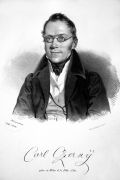
Carl Czerny
(1791-1857)

 |
Carl Czerny |
 |
Carl Czerny was an Austrian composer, pianist and teacher and one time student of Beethoven. His musical output amounted to more than one thousand compositions and arrangements and his study books are still widely used in piano teaching.
Born in Vienna in 1791 to Czech parents (Bohemia and Moravia then forming part of the Austro-Hungarian Empire) Czerny came from a family of musicians. A child prodigy, he began playing the piano when he was three and was composing music by the age of seven, under the instruction of his father. He gave his first public recital, playing a Mozart piano concerto, in 1800 at the age of ten.
In 1801, the young Czerny was introduced to and played for Beethoven, who was sufficiently impressed to accept him as a pupil. He remained under Beethoven's tuition for the following three years and sporadically thereafter. Beethoven subsequently chose Czerny to give the first public performances of his Piano Concerto No. 1 in 1806 and his Piano Concerto No. 5 "Emperor" in 1812. Czerny later wrote that he knew all Beethoven's works and could play them by heart. He kept up his relationship with Beethoven until the latter's death in 1827 and at one time gave piano lessons to Beethoven’s nephew Carl.
Czerny began his highly successful and long teaching career at the age of fifteen in 1806, giving as many as twelve lessons a day in the homes of the wealthy Viennese. In 1819, he started teaching the eight year old Franz Liszt, the son of near neighbours in Vienna. Liszt became his most famous pupil and they remained close until Czerny’s death in 1857. Czerny also introduced the young Liszt to Beethoven.
Czerny continued teaching piano until 1840 and then devoted the last seventeen years of his life to composition, producing among other things a huge number of piano exercises for pianists of all abilities and levels. In all, he composed over a thousand pieces, including piano pieces of all kinds but also what he apparently regarded as "serious" music, including masses, choral music, quartets and orchestral and chamber music. His most enduring legacy, however, has been his didactic piano pieces, although some of his other compositions are still performed in public. Czerny never married or had children and when he died in 1857, he left a number of his musical manuscripts, both published and unpublished, to Vienna's Society for the Friends of Music. Despite his relative lack of acclaim as a composer in his own right, Czerny is still widely considered to be a father of modern piano technique and his influence can be traced to any number of renowned musicians of the last century. His professed admirers included both Brahms and Stravinsky.
It is difficult to come up with anything to enliven or colour this brief account of Czerny. Unlike his pupil Liszt, he appears to have led a pianocentric, scandal free, morally and, dare one say, rather dull life. But he died by all accounts rich and famous!